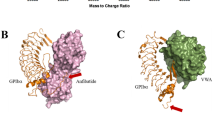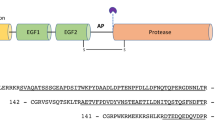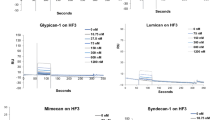Abstract
ANCROD is a thrombin-like enzyme obtained from the venom of Agkistrodron rhodostroma. When added to plasma, ancrod initiates fibrin polymerisation by the cleavage of fibrinopeptide A from fibrinogen1 but activates factor XIII (plasma transglutaminase) very slowly2. Factor XIII, when activated, catalyses the formation of crosslinks between the α chains and between the γ chains of fibrin3. The absence of these cross-linked chains, especially the α chain polymers, allows fibrin to be easily degraded by plasmin4,5. Thus it is believed that ancrod acts as a defibrinating agent in vivo by producing non-cross-linked easily lysable fibrin deposits. We wish to present some preliminary evidence to show that commercial preparations of ancrod activate factor XIII in plasma in vitro and may also mediate the conversion of prothrombin to thrombin. In addition a hypothesis is presented to explain the defibrinating effect of ancrod in vivo.
This is a preview of subscription content, access via your institution
Access options
Subscribe to this journal
Receive 51 print issues and online access
$199.00 per year
only $3.90 per issue
Buy this article
- Purchase on Springer Link
- Instant access to full article PDF
Prices may be subject to local taxes which are calculated during checkout
Similar content being viewed by others
References
Ewart, M. R., Hatton, M. W. C., Basford, J. M., and Dodgson, K. S., Biochem. J., 118, 603 (1970).
Mattock, P., and Esnouf, M.P., Nature new Biol., 223, 277 (1971).
McKee, P. A., Mattock, P., and Hill, R. L., Proc. natn. Acad. Sci. U.S.A., 66, 738 (1970).
McDonagh, R. P., McDonagh, J., and Duckert, F., Br. J. Haemat., 21, 323 (1972).
Gaffney, P. J., and Brasher, M., Biochim. biophys. Acta, 295, 308 (1972).
Weber, K., and Osborn, M., J. biol. Chem., 244, 4406 (1969).
Gaffney, P. J., and Dobos, P., FEBS Lett., 15, 13 (1971).
Pizzo, S. V., Schwartz, M. L., Hill, R. L., and McKee, P., J. clin. Invest., 51, 2841 (1972).
Edgar, W., and Prentice, C. R. M., Thromb. Res., 2, 85 (1973).
Gaffney, P. J., Nature new Biol., 234, 281 (1971).
Gaffney, P. J., and Brasher, M., Nature, 244, 361 (1973).
Von Hugo, R., and Graeff, H., Thromb. Diath. Haemorrh., 29, 122 (1973).
Kierulf, P., Thromb. Res., 3, 613 (1973).
Dalin, G. R., and Lewis, J. H., Nature, 195, 87 (1962).
Nakas, L., Denson, K. W. E., and Macfarlane, R. G., Thromb. Diath. Haemorrh., 12, 355 (1964).
Denson, K. W. E., Toxin, 7, 5 (1969).
Muller-Berghaus, G., and Mann, B., Thromb. Res., 2, 305 (1973).
Sharp, A. A., Warren, B. A., Paxton, A. M., and Allington, M. J., Lancet, i, 493 (1968).
Author information
Authors and Affiliations
Rights and permissions
About this article
Cite this article
GAFFNEY, P., BRASHER, M. Mode of action of ancrod as a defibrinating agent. Nature 251, 53–54 (1974). https://doi.org/10.1038/251053a0
Received:
Revised:
Issue Date:
DOI: https://doi.org/10.1038/251053a0
This article is cited by
Comments
By submitting a comment you agree to abide by our Terms and Community Guidelines. If you find something abusive or that does not comply with our terms or guidelines please flag it as inappropriate.



